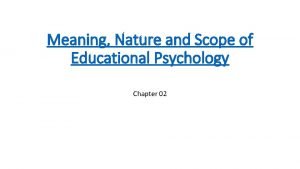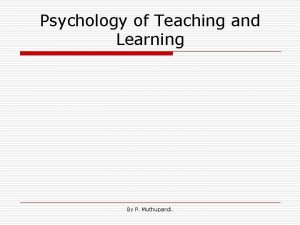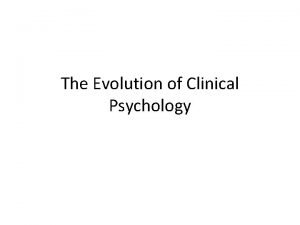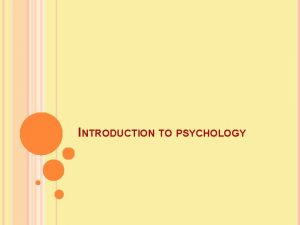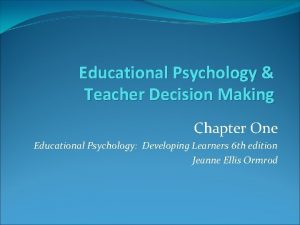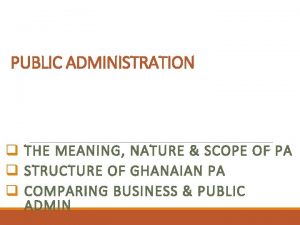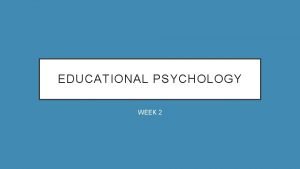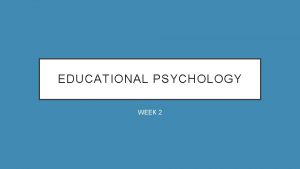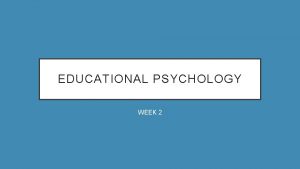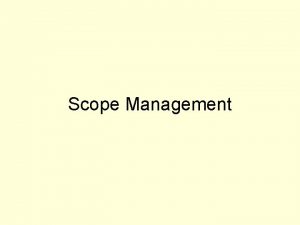Meaning Nature and Scope of Educational Psychology Chapter







- Slides: 7

Meaning, Nature and Scope of Educational Psychology Chapter 02

What is Psychology? • The word, ‘Psychology’ is derived from two Greek words, ‘Psyche’ and ‘Logos’. Psyche means ‘soul’ and ‘Logos’ means ‘science’. Thus psychology was first defined as the ‘science of soul”. • According to earlier psychologists, the function of psychology was to study the nature, origin and destiny of the human soul. But soul is something metaphysical. It cannot be seen, observed and touched and we cannot make scientific experiments on soul. • In the 18 th century, psychology was understood as the ‘Science of Mind’. William James (1892) defined psychology as the science of mental processes. But the word ‘mind ‘ is also quite ambiguous as there was confusion regarding the nature and functions of mind. • Modern psychologists defined psychology as the “Science of Consciousness”. James Sully (1884) defined psychology as the “Science of the Inner World”. Wilhelm Wundt (1892) defined psychology as the science which studies the “internal experiences’. But there are three levels of consciousness – conscious, subconscious and the unconscious and so this definition also was not accepted by some. • Thus psychology first lost its soul, then its mind and then its consciousness. At present only its behaviour exists. William Mc. Dugall (1905) defined psychology as the “Science of Behaviour”, W. B. Pillsbury (1911) and J. B. Watson (1912) also defined psychology as the science of behavior. • Behaviour generally means overt activities which can observed and measured scientifically. But one’s behaviour is always influenced by his experiences. So when we study one’s behaviour we must also study his experiences. • Psychology should, therefore, be defined as a “science of behaviour and experiences on human beings” (B. F. Skinner) • According to Crow and Crow, “Psychology is the study of human behaviour and human relationship’”.

What is Educational Psychology? • Educational psychology is that branch of psychology in which the findings of psychology are applied in the field of education. It is the scientific study of human behaviour in educational setting. • According to Charles. E. Skinner, “Educational psychology deals with the behaviour of human beings in educational situations”. • Thus educational psychology is a behavioural science with two main references– human behaviour and education. • In the words of E. A. Peel, “Educational Psychology is the science of Education”. • Education by all means is an attempt to mould and shape the behaviour of the pupil. It aims to produce desirable changes in him for the all-round development of his personality. • The essential knowledge and skill to do this job satisfactorily is supplied by Educational Psychology. In the words of E. A. Peel, “Educational psychology helps the teacher to understand the development of his pupils, the range and limits of their capacities, the processes by which they learn and their social relationships. ” • In this way, the work of the Educational Psychologists resembles with that of an Engineer, who is a technical expert. The Engineer supplies all the knowledge and skill essential for the accomplishment of the job satisfactorily… for example, construction of a bridge. • In the same way Educational Psychologists, who is a technical expert in the field of Education, supplies all the information, principles and techniques essential for understanding the behaviour of the pupil in response to educational environment and desired modification of his behaviour to bring an all-round development of his personality. • In this way, it is quite reasonable to call Educational Psychology as a science and technology of Education. • Thus, Educational Psychology concerned primarily with understanding the processes of teaching and learning that take place within formal environments and developing ways of improving those methods. It covers important topics like learning theories; teaching methods; motivation; cognitive, emotional, and moral development; and parent-child relationships etc. • In short, it is the scientific discipline that addresses the questions: “Why do some students learn more than others? ” and “What can be done to improve that learning? ”

NATURE OF EDUCATIONAL PSYCHOLOGY 1. 2. 3. 4. 5. 6. Educational Psychology is a science Educational Psychology is a natural science Educational psychology is a social science Educational psychology is a positive science Educational psychology is an applied science Educational psychology is a developing or growing science

W. A. Kelly (1941) listed the nature of Educational Psychology as follows: To give a knowledge of the nature of the child. To give understanding of the nature, aims and purposes of education To give understanding of the scientific methods and procedures which have been used in arriving at the facts and principles of educational psychology To present the principles and techniques of learning and teaching To give training in methods of measuring abilities and achievement in school subjects To give a knowledge of the growth and development of children To assist in the better adjustment of children and to help them to prevent maladjustment To study the educational significance and control of emotions and To give an understanding of the principles and techniques of correct training.

SCOPE OF EDUCATIONAL PSYCHOLOGY • The Learner • The Learning Experiences. • Learning Situation or Environment • The Teacher • It studies Human Behaviour • Growth and Development • Heredity and Environment • Nature and Development of the Personality • Individual Difference

Cont. ………………… • Intelligence and its Measurement • Guidance and Counselling
